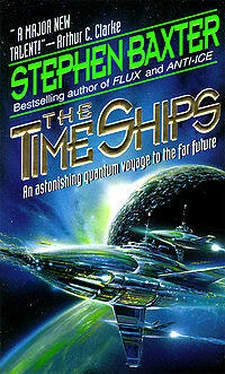I felt dizzy, and a huge pain seemed to be hovering around my head, waiting to descend; I knew that when I lost this momentary numbness, I should suffer indeed. But there was no time. “Where’s Nebogipfel?”
“Here.”
The Morlock stood in the street, unharmed; he had lost his cap, though, and his goggles were starred by some flying fragment. His notes were scattered about, their file having burst, and Nebogipfel watched the pages blow away.
People had been scattered like skittles by the blast and concussion. All round us, they lay in awkward positions, with body on top of body, flung arm, twisted feet, open mouth, staring eyes, old men on top of young women, a child lying on a soldier’s back. There was much stirring and groaning, as people struggled to rise — I was reminded of nothing so much as a heap of insects, squirming over each other — and here and there I saw splashes of blood, dark against flesh and clothing.
“My God,” Moses said with feeling. “We have to help these people. Can you see—?”
“No,” I snapped at him. “We can’t — there are too many; there’s nothing we can do. We’re lucky to be alive — don’t you see that? And now that the guns have got their range — Come! We have to stick to our intention; we have to escape from here, and into time.”
“I can’t bear it,” Moses said. “I’ve never seen such sights.”
The Morlock came up to us now. “I fear there’s worse to see before we’re done with this century of yours,” he said grimly.
So we went on. We stumbled over a road surface become slippery with blood and excrement. We passed a boy, moaning and helpless, evidently with a shattered leg; despite my earlier admonitions, Moses and I were quite unable to resist his plaintive weeping and cries for help, and we bent to lift him from where he lay, close to the body of a milkman, and we sat him up against a wall. A woman emerged from the crowd, saw the child’s plight and came to him; she began to wipe his face with a handkerchief.
“Is she his mother?” Moses asked me.
“I don’t know. I—”
That odd, liquid voice sounded behind us, like a call from another world. “ Come.”
We went on, and at length we reached the corner of Queen’s Gate with the Terrace; and we saw how this had been the epicenter of the blast.
“No gas, at least,” I said.
“No,” Moses said, his voice tight. “But — oh, God! — this is enough!”
There was a crater, torn into the road surface, a few feet across. Doors were beaten in, and there was not a window left intact as far as I could see; curtains dangled, useless. There were subsidiary craters in the pavements and walls, left by bits of shrapnel from the exploded shell.
And the people…
Sometimes language is incapable of portraying the full horror of a scene; sometimes the communication of remembered events between humans, which is the basis of our shared society, breaks down. This was one such time. I could not communicate the horror of that London street to anyone who did not witness it.
Heads were blown off. One lay on the pavement, quite neatly, beside a small suitcase. Arms and legs littered the scene, most still clothed; here I saw one outstretched limb with a watch at the wrist — I wondered if it was still working! — and here, on a small, detached hand which lay close to the crater, I saw fingers curled upwards like a flower’s petals. To describe it so sounds absurd — comical! Even at the time I had to force myself to understand that these detached components had comprised, a few minutes ago, conscious human beings, each with a life and hope of his own. But these bits of cooling flesh seemed no more human to me than the pieces of a smashed-up bicycle, which I saw scattered across the road.
I had never seen such sights before; I felt detached from it all, as if I were moving through the landscape of a dream — but I knew that I should forever revisit this carnage in my soul. I thought of the Interior of the Morlocks’ Sphere, and imagined it as a bowl filled with a million points of horror and suffering, each as ghastly as this. And the thought that such madness could descend on London — my London — filled me with an anguish that caused a sensation of actual physical pain in my throat.
Moses was pallid, and his skin was covered by a sheen of fine sweat and dust; his eyes were huge and flickered about, staring. I glanced at Nebogipfel. Behind his goggles, his large eyes were unblinking as he surveyed that awful carnage; and I wondered if he had begun to believe that I had transported him — not into the past — but to some lower Circle of Hell.
We struggled through the last few dozen yards to the walls of Imperial College; and there we found, to my dismay, our way blocked by a soldier, masked and with a rifle. This fellow — stout-hearted, but evidently quite without imagination — had stayed at his post, while the gutters of the street before him had turned red with blood. His eyes became huge, behind their protective discs of glass, at the sight of Nebogipfel.
He did not recognize me, and he adamantly would not let us pass without the proper authority.
There was another whistle in the air; we all cringed — even the soldier clutched his weapon to his chest like a totemic shield — but, this time, the shell fell some distance from us; there was a flash, a smash of glass, a shudder of the ground.
Moses stepped up to the soldier with his fists clenched. His distress at the bombing seemed to have metamorphosed into anger. “Did you hear that, you confounded uniformed flunky?” he bellowed. “It’s all chaos anyway! What are you guarding? What’s the point anymore? Can’t you see what’s happening?”
The guard pointed his rifle at Moses’s chest. “I’m warning you, chappy—”
“No, he doesn’t see.” I interposed myself between Moses and the soldier; I was dismayed by Moses’s evident lack of control, regardless of his distress.
Nebogipfel said, “We may find another way. If the College walls are breached—”
“No,” I said with determination. “This is the route I know.” I stepped up to the soldier. “Look, Private, I don’t have authority to pass you — but I have to assure you I’m important for the War Effort.”
Behind the soldier’s mask, his eyes narrowed.
“Make a call,” I insisted. “Send for Dr. Wallis. Or Professor Gödel. They’ll vouch for me — I’m sure of it! Please check, at least.”
At length — and with his gun pointed at us — the trooper backed into his doorway, and lifted a light telephone receiver from the wall.
It took him several minutes to complete the call. I waited with mounting anguish; I could not have borne to be kept away from an escape into time by such a pettifogging obstacle — not after having made it through so much! At last, grudgingly, he said: “You’re to go to Dr. Wallis’s office.” And with that our simple, brave soldier stood aside, and we stepped out of the chaos of that street and into the comparative calm of Imperial College.
“We’ll report to Wallis,” I told him. “Don’t worry. Thank you…!”
We entered that maze of enclosed corridors I have described earlier.
Moses let out a grunt of relief. “Just our luck,” he said, “to come up against the only soldier still at his post in all of confounded London! The hopeless little fool—”
“How can you be so contemptuous?” I snapped. “He is a common man, doing the job he’s been given as best he can, in the middle of all this — a madness not of his making! What more do you want from a man? Eh?”
“Huh! How about imagination? Flair, intelligence, initiative—”
Читать дальше
Конец ознакомительного отрывка
Купить книгу









